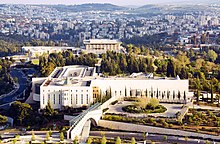| Supreme Court of Israel | |
|---|---|
| Hebrew: בית המשפט העליון Arabic: المحكمة العليا | |
 Emblem of Israel[1] | |
 | |
 | |
| 31°46′51″N 35°12′13″E / 31.78083°N 35.20361°E | |
| Established | 1948 |
| Location | Givat Ram, Jerusalem |
| Coordinates | 31°46′51″N 35°12′13″E / 31.78083°N 35.20361°E |
| Composition method | Presidential appointment upon nomination by the Judicial Selection Committee |
| Authorised by | Basic Laws of Israel |
| Number of positions | 15 |
| Website | https://supreme.court.gov.il |
| President | |
| Currently | Yitzhak Amit (acting) |
| Since | 1 October 2024 |
| Lead position ends | TBD |
| Jurist term ends | 20 October 2028 |
| Deputy President | |
| Currently | Vacant |
| Since | TBD |
The Supreme Court of Israel (Hebrew: בֵּית הַמִּשְׁפָּט הָעֶלְיוֹן, romanized: Bet HaMishpat HaElyon, Hebrew acronym Bagatz; Arabic: المحكمة العليا, romanized: al-Maḥkama al-‘Ulyā) is the highest court in Israel. It has ultimate appellate jurisdiction over all other courts, and in some cases original jurisdiction.
The Supreme Court consists of 15 judges appointed by the President of Israel, upon nomination by the Judicial Selection Committee. Once appointed, Judges serve until retirement at the age of 70 unless they resign or are removed from office. Yitzhak Amit became the acting President of the Supreme Court of Israel on 1 October 2024 after Vogelman stepped down, until a permanent president is appointed by the Judicial Selection Committee, which may take place sometime in November.[2]
The Court is situated in Jerusalem's Givat Ram governmental campus, about half a kilometer from Israel's legislature, the Knesset.
When ruling as the High Court of Justice (Hebrew: בֵּית מִשְׁפָּט גָּבוֹהַּ לְצֶדֶק, Beit Mishpat Gavo'ah LeTzedek; also known as its acronym Bagatz, בג"ץ), the court rules on the legality of decisions of State authorities: government decisions, those of local authorities and other bodies and persons performing public functions under the law, and direct challenges to the constitutionality of laws enacted by the Knesset. The court may review actions by state authorities outside of Israel.
By the principle of binding precedent (stare decisis), Supreme Court rulings are binding upon every other court, except itself. Over the years, it has ruled on numerous sensitive issues, some of which relate to the Israeli–Palestinian conflict, the rights of Arab citizens, and discrimination between Jewish groups in Israel.
On 24 July 2023, the Knesset passed a bill to prevent the Supreme Court from 'consider[ing] the reasonableness of a decision of the government, the prime minister, or any other minister',[3] which would diminish the power of the Supreme Court to check future actions of the government.[4] On 1 January 2024 the Supreme Court overturned the bill in an 8-7 decision.[5][6][7]
- ^ Version of emblem of Israel used by the Judicial Authority. court.gov.il
- ^ "Vogelman retires as Supreme Court president in shadow of severe judiciary-gov't clash". Times of Israel.
- ^ Levush, Ruth. "Israel: Legislation Abolishes Reasonableness as a Standard for Judicial Review of Government's Decisions". Library of Congress. Retrieved July 5, 2024.
- ^ Reasonableness bill passes 64-0 after compromise falls at last minute
- ^ "High Court strikes down reasonableness amendment". Globes. January 1, 2024. Retrieved January 1, 2024.
- ^ "High Court ruling undoes sole achievement of government's judicial overhaul". The Times of Israel. January 1, 2024. Retrieved January 1, 2024.
- ^ Edwards, Christian (January 2, 2024). "What we know about Israel's Supreme Court ruling on Netanyahu's judicial overhaul". CNN. Retrieved January 2, 2024.